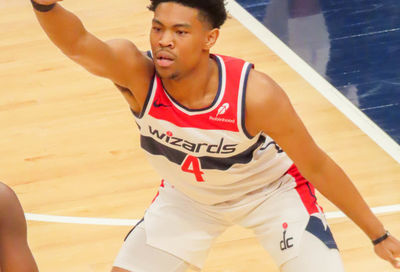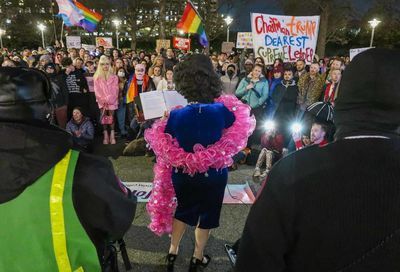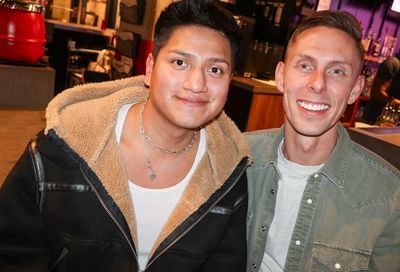For all the suffering that’s been heaped upon gays onstage over the years — from the alcoholic angst of The Boys in the Band to the agony of AIDS in Angels in America — you’d think that by the time Next Fall made it to Broadway in 2010, someone else could’ve been mowed down by the cab.
But no. Playwright Geoffrey Nauffts explores matters of life and death — both physical and spiritual — with gay lives once again on the line: Luke, an actor in a coma after being hit by a New York taxi, and Adam, the boyfriend who must navigate the tragic terrain alongside two people, Luke’s parents, who literally don’t know that Adam exists.

Next Fall
(Photo by Danisha Crosby)
That’s because Luke and his folks are fundamentalist Christians, and Luke, as we learn in flashbacks, fears the rupture that his coming out, and introducing Adam, would cause. And even though Luke believes that homosexuality is a sin (albeit one in which he happily/guiltily indulges), he doesn’t fear the Rapture, since he feels that his faith in Jesus Christ provides salvation from shortcomings of the human condition.
Speaking of Jesus, it’s pretty miraculous that Adam and Luke have even made it through the four years they’ve been together. Luke’s brand of Christianity dictates that only believers will go to Heaven, which leaves Adam — a nonbeliever through and through — hellbound unless he gets on board with Luke’s theology. What really gets to Adam, however, isn’t the proselytizing, or being hidden from Luke’s family, it’s Luke’s habit of praying after sex. (Presumably, he’s not giving thanks.)
Neither Nauffts’s characterizations nor the interpretations by Tom Story as Adam and Chris Dinolfo as Luke in the current Round House Theatre production shed enough light on what binds the couple. There’s chemistry, sure (which gets a boost from the actors’ offstage romantic relationship), but they ultimately both seem stuck in a holding pattern, settling for something that really suits neither one of them.
Luke is waiting for Adam’s conversion, hoping that the Rapture doesn’t happen first or that one of them doesn’t, you know, get run over by a taxicab. And Adam — older, neurotic, brimming with self-doubt — has been treading water for years, devoting prime career time to a job in a candle shop owned by self-proclaimed fag hag Holly (Dawn Ursula). Upon meeting Luke, Adam does move on to a teaching gig, long ago having let his dream of writing fall by the wayside, apparently along with any expectation that he deserves a partner who has more respect for him than to nag him about burning in hell if he doesn’t do what he’s told.
NEXT FALL


1/2
To Feb. 26
Round House Theatre
4545 East West Hwy.
Bethesda
$10-$61
240-644-1100
roundhousetheatre.org
In other words, the situation is pretty tragic long before Luke winds up in the ICU. Dramatic tension builds at the hospital in the first act as Adam gauges his options for dealing with Luke’s flaky, pill-popping mom, Arlene (Kathryn Kelley), and his bullying, bombastic dad, Butch (yes, Butch, portrayed by Kevin Cutts). But director Mark Ramont can’t overcome the playwright’s melodramatic choices that send the second act spiraling into the realm of soap operas, old disease-of-the-week TV movies and ER reruns.
Nauffts rarely seizes upon opportunities for nuance, though they abound. Must Luke’s Southern father be both a virulent homophobe and a racist, expressed in the crudest of terms? Must Luke’s Christian friend Brandon (Alexander Strain) be even more conflicted over his sexuality than Luke is, going so far as to channel it into a racial fetish that he feels compelled to hide from view in his day-to-day life?
I mean, maybe Episcopalians with ennui on the Upper East Side wouldn’t make the most gripping family-and-friends milieu, but there’s such a rich diversity of Christian belief that Next Fall ignores. And there are surely richer gay characters who, when faced with enemy forces, aren’t looking at themselves in the mirror.























